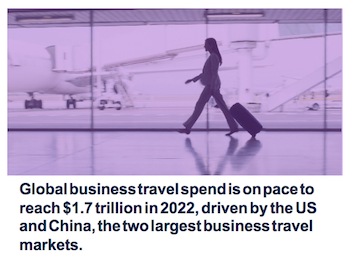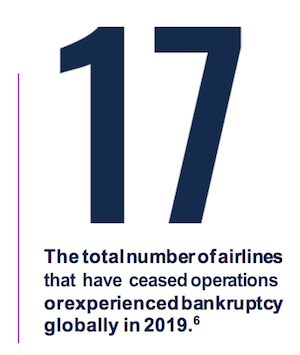Travel Industry Outlook for CFOs
What CFOs at small to medium size businesses should know about corporate travel in the new year.
From oil price fluctuations to global supply chain challenges, here are the key trends small or medium-sized businesses (SMBs) should know about to better understand how their corporate travel will be impacted.

There is some good news for Chief Financial Officers as they begin planning for their corporate travel budget – travel cost increases though expected, won’t grow at nearly the same rate as in years prior. Trade war threats, Brexit, oil supply issues, and the possibility of another recession are all predicted to contribute to a travel slowdown, which will keep prices from increasing at previous levels. So while SMBs may not see a significant rise in prices, they should expect ancillary fees from airlines and hotels to grow - adding to their overall travel costs.
THE COST OF TRAVEL
Global hotel rates will rise by an estimated 1.3 percent¹ and global airfares are expected to rise by 1.2 percent², according to Business Travel News. In North America, the increase in airfare cost will be closer to 2.3 percent while lodging will likely increase by about 2.2 percent³.
While these growth rates are smaller than previous years, it is still vital for small to medium-sized companies to adequately prepare for these increases within their budgets.
Why is airfare expected to increase?
There are a few factors that are likely to contribute to airfare increase.
The Cost of Oil. International crude oil disputes - whether nestled in the midst of trade disputes or because of geopolitical unrest in oil-rich regions - have historically led to disruptions in oil flow. These disruptions almost always cause a predictable increase in jet fuel costs and that increase is passed onto the airline customer. Recent unrest in Saudi Arabia that took their oil production offline for a period, caused a significant drop in airline stock prices, as jet fuel prices surged. Oil price fluctuations will impact each major carrier in different ways⁴ - and it’s important for SMBs to understand if their preferred airline will be victim to these ebbs and flows come 2020.Interested in learning about how airlines hedge against oil costs? Head over to Eurofinance to learn more.

1. Reduced airline competition. “2019 has seen the fastest growth in airline failure in history,”said airline consulting firm IBA”⁵.While the US market has been largely shielded from these collapses, their impact on international markets is significant. The contraction of the airline industry could lead to a decrease in competition in certain markets (Brazil and India to name a few), which may mean an increase in price, as travelers have fewer carriers to choose from.
2. Contract renewals for airline labor. Labor costs for airlines are predicted to rise as pilot and maintenance-worker unions continue to negotiate contract renewals.⁷ These labor disputes are likely to result in increased wages, an added cost airlines will look to make up elsewhere in their operations. Airlines will typically look first at upping the cost for non-fare related add-ons (think wi-fi, lounge access or loyalty programs), but increased airfares aren’t out of the realm of possibility.
What about hotel costs?
While SMBs can expect to see an increase in lodging costs in 2020, there is good news. Costs are expected to grow at a much lower rate than in years prior. North American hotel costs are expected to grow 2.2 percent⁸ (vs. 3.7 percent in 2019).⁹ Here are a few of the external factors that are contributing to this slow down:
Increased hotel competition. In order to compete with non-traditional lodging options,such as AirBnb, hotels are creating brands and properties that more closely resemble these sharing-economy options. From increased technology, to spaces that feel more communal, expect a lot more choice in the traditional lodging space in the near future.¹⁰
The need for traditional hotel chains to keep up with their new sharing-economy neighbors has never been more important. Millennials are expected to make up 50 percent of the workforce and seek these experiential (and more economical) lodging options more frequently than their older counterparts.¹¹ Footnote: On a recent trip to Boston a CFO.University employee saved over $1000 in accommodations over only two nights by booking a comfortable and convenient AirBnb property versus a traditional hotel property.
3. Supply is meeting demand. As more hotels have opened and non-traditional lodging has become more popular, the demand for rooms is aligning more closely with supply. This will result in a slight slowdown in hotel rate increases for 2020¹². While that is good news for leisure travelers, it could pose a problem for SMBs. In response to the decrease in demand, some hotel chains may reduce or cancel their corporate discounts and restructure their rewards programs, which could result in businesses paying more for hotel rooms and some unhappy road warriors.
BE ALERT! While room rates may not increase significantly in 2020, hotels are increasingly looking for ways to grow revenue. One key place to keep an eye on: cancellation windows. Expect to see instances where the traditional no-fee cancellation window grows from 24 hours before check-in to 72 hours.¹³
4. Resort fees under scrutiny. Hotel resort fees and in particular the way in which they are displayed online, have long been a hot topic among consumer advocacy groups and the Federal Trade Commission. Just recently, a new Congressional bill was introduced that would bar hotels from advertising rates that did not already include the resort fee. Hotels are adamant that resort fees are an integral component to their economic model and allow them to deliver quality stays for their travelers. Many believe the way they currently disclose resort fees should suffice. Whether the HotelAdvertising Transparency Act of 2019 passes or not, SMBs should expect resort fees to stick around for the near future and should inform their employees to be on the lookout for the fees before they purchase their lodging.¹⁴
What can a CFO do to prepare their business for travel changes in 2020?
1. Lock in your corporate discount rates, if possible.
While corporate discounts aren’t always accessible to SMBs, if you have them, you should talk with your corporate representative at hotels and car rental companies as soon as possible. Try to lock in your contract at your current discounted rate. Even if you are unable to keep your rate, you will likely get a better understanding of what change to expect from your trusted company so that you can plan better for the coming year.
Before signing a new contract with a previous partner, it may also be worth exploring other options. You may want to contact other hotel chains and car rental companies or consider if it’s best to switch to a travel management company. Some TMCs are able to supply corporate level discounts to their SMB clients - often beating the deals companies can get on their own.
2. Use the rise of bleisure to your advantage.
Your employees are also impacted by the increasing cost of travel. Savvy employees are combining business and leisure trips to create “bleisure” trips. By combining work with leisure travel, they can visit locations that they might not be able to afford otherwise. In the U.S., an estimated 43 percent of trips can be categorized as bleisure and that percentage is only expected to increase¹⁵.
As an employer, consider tapping into this trend as an employee perk.
For example, allow return flights to occur beyond the required meeting end day of the trip, especially if the trip is scheduled to end on Thursday or Friday. By allowing employees to return on their own time, like a Sunday evening, you’ll likely enjoy lower costs due to the off-peak nature of the travel.
3. Investigate your readiness for a travel management system.
Corporate travel management systems have come a long way since they initially came to market for large companies. Benefits of a TMS can include a reduction in unnecessary travel expenses and fees, simplified booking of travel arrangements, less travel administration time and costs, improved travel policies communication and increased travel options for travelers
If travel is a key part of the investment you make in your business investigating TMS options for your business may yield some significant benefits.
- https://www.businesstravelnews.com/Procurement/Air-Hotel-Rate-Outlook-for-2020-Region-by-Region
- ibid
- https://www.mycwt.com/insights/forecast/#!/page/8/3
- https://www.fool.com/investing/2019/09/17/southwest-airlines-shrugging-off-oil-pric e-spike.aspx?Cid=qRjNUd
- https://www.reuters.com/article/us-airlines-bankruptcy/airline-bankruptcies-surge-lea ving-rivals-vying-for-planes-idUSKBN1WJ1JH
- ibid
- https://simpleflying.com/uk-ryanair-pilot-strikes/
- https://www.mycwt.com/insights/forecast/#!/page/8/3
- https://www.travelagentcentral.com/running-your-business/stats-flight-prices-set-to-ri se-2-9-2019
- https://www.nytimes.com/2019/04/29/travel/marriott-airbnb-homeshare-luxury.html
- https://www.mycwt.com/insights/forecast/#!/page/8/5
- https://www.businesstravelnews.com/Lodging/A-Slowdown-Looms-for-US-Hotel-Indu stry-According-to-CBRE
- https://www.mycwt.com/insights/forecast/#!/page/8/5
- https://skift.com/2019/10/01/new-resort-fee-legislation-would-disrupt-how-hotels-are-sold-online/
- https://etn.travel/bleisure-travel-43-business-trips-extended-leisure-purposes-6218/
Identify your path to CFO success by taking our CFO Readiness Assessmentᵀᴹ.
Become a Member today and get 30% off on-demand courses and tools!
For the most up to date and relevant accounting, finance, treasury and leadership headlines all in one place subscribe to The Balanced Digest.
Follow us on Linkedin!
